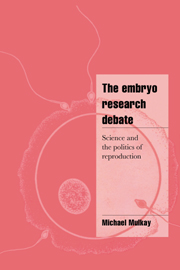Book contents
- Frontmatter
- Contents
- Preface and acknowledgements
- List of abbreviations
- Introduction
- 1 The background to the debate
- 2 The sequence of parliamentary debate
- 3 Political parties and ministerial tactics
- 4 The impact of the pro-research lobby
- 5 Embryos in the news
- 6 Women and men
- 7 Science and religion
- 8 The myth of Frankenstein
- 9 Embryo research and the slippery slope
- Epilogue: intruders in the fallopian tube or a dream of perfect human reproduction
- Notes
- Index
5 - Embryos in the news
Published online by Cambridge University Press: 24 August 2009
- Frontmatter
- Contents
- Preface and acknowledgements
- List of abbreviations
- Introduction
- 1 The background to the debate
- 2 The sequence of parliamentary debate
- 3 Political parties and ministerial tactics
- 4 The impact of the pro-research lobby
- 5 Embryos in the news
- 6 Women and men
- 7 Science and religion
- 8 The myth of Frankenstein
- 9 Embryo research and the slippery slope
- Epilogue: intruders in the fallopian tube or a dream of perfect human reproduction
- Notes
- Index
Summary
During the passage of the Human Fertilization and Embryology Bill, the media of mass communication relayed the various views expressed in Parliament to the public at large and commented on the issues involved. Because opinion remained deeply divided among the wider population, and because the outcome of the parliamentary process seemed uncertain to the very end, embryo research continued to be newsworthy until the final vote had been taken. Those for, as well as those against, embryo research attempted to use the media to influence public opinion and, thereby, to incline wavering MPs in their favour.
Both sides had previously commissioned surveys of public opinion and had used the results to strengthen their recommendations that embryo research should, or should not, be allowed to continue. But as the debate entered its last phase, the opponents of embryo research appeared to be losing the battle of the polls. This point was emphasized in Parliament by the advocates of such research. Some of those arguing for the prohibition of embryo research still insisted that the public was on their side. However, in order to make this assertion at all convincing, they had to try to show that the pollsters' measurements of opinion were inaccurate.
- Type
- Chapter
- Information
- The Embryo Research DebateScience and the Politics of Reproduction, pp. 69 - 82Publisher: Cambridge University PressPrint publication year: 1997



